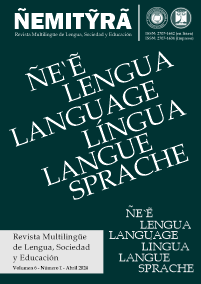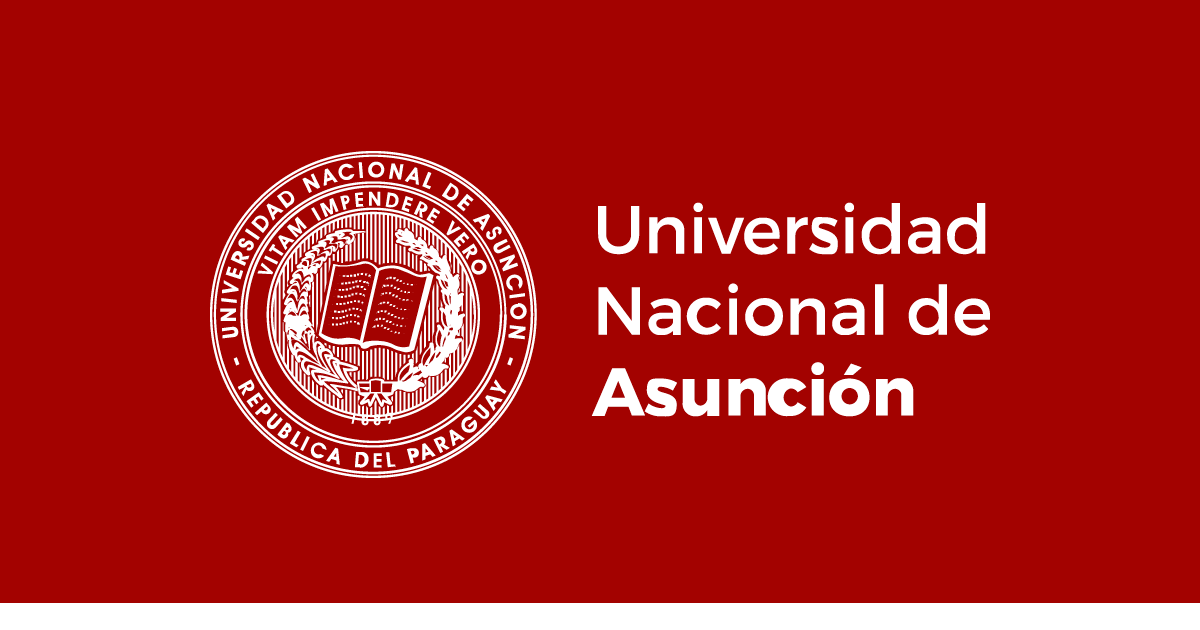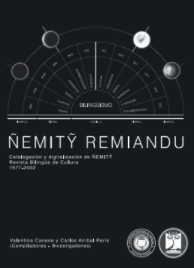Amplifying English Language Teachers’ in-betweenness of their experiences in peace construction
DOI:
https://doi.org/10.47133/NEMITYRA20240601-A5Palabras clave:
peace construction, in-betweenness, voices, experiences, English language teachers, decolonialityResumen
Peace studies and Applied Linguistics (AL) to English language teaching complement each other. In the second field, domains such as peace linguistics appear. This manuscript contributes to this de-instrumentalized field and its domain. This inquiry approached English language teachers’ experiences in peace construction from diverse Colombian territories where dehumanizing practices perpetuate. Some formal proposals towards peace constrain English language teachers’ agencies and bodies. However, their alternative positions, and doings in peace construction otherwise, transcend instrumental goals of the liberal peace. This study amplified English language teachers’ voices to access their experiences from decolonial postures critically nuanced. Theoretical foundations conceptually discuss peace construction, experiences, and voices. This qualitative inquiry problematized narrative design and decolonial doing to create a methodological option called Otherwise Intuitive Undoings (OIUs). Its constitutive decisions were multimodal encountering, and comaking resenses to react to traditional data analysis. This intersected narrative analysis and crystallization to challenge rational treatments of what mainstream researchers demand as data analysis. Findings amplify spiritual sensing-thinking from English language teachers’ experiences in-between, which characterize for their dynamics and discontinuities. Third spaces herein constitute places where pluridimensional experiences occur, and bodies-selves transform through an acquired elasticity. Disruptive knowings, becomings, and doings in peace construction reflected the creative power of English language teachers’ bodies-selves. Note that the methodological option represents a contribution herein, crafted throughout the path. OIUs became an option in a line of flight that resisted some de-humanizing research principles, while resulting from English language teachers’ engagement with methodological decisions. Conclusions and implications synthesize systemic relationships among peace studies and AL to ELT for inspiring researchers. Third spaces from English language teachers’ amplified experiences deserve re-existence. Precisely, hearing our already existing voices, –as claimed in this study from the beginning–, rather than voicing the marginalized or the inexistent, opens a neglected debate about ethics in decolonial and critical postures.
Referencias
Aldana, Y. (2022). In the path of creating a relational “How” in research. In A. Zimmerman. Methodological innovations in research and academic writing (120-142). IGI Global publishing.
Aldana, Y. (2021a). Una lectura otra sobre la construcción de paz en la enseñanza del inglés. Análisis, 53(98). https://doi.org/10.15332/21459169.6300
Aldana, Y. (2021b). Possible Impossibilities of Peace Construction in ELT: Profiling the Field. HOW, 28(1), 141–162. https://doi.org/10.19183/how.28.1.585
Asenbaum, H. (2021). The politics of becoming: Disidentification as radical democratic practice. European Journal of Social Theory, 24(1), 86–104.
Barkhuizen, G., Benson, P. y Chick, A. (2014). Investigación narrativa en la investigación sobre la enseñanza y el aprendizaje de lenguas. Routlege.
Benesch, S. (2012). Considering emotions in critical English language teaching. Routledge.
Benesch, S. (2017). Emotions and English language teaching: Exploring Teachers' Emotions labor. Taylor & Francis.
Bhabha, H. (2004). The location of culture. Routledge.
Bruyneel, K. (2007). The Third Space of Sovereignty: The Postcolonial Politics of U.S.–Indigenous Relations. University of Minnesota.
Buffone, J. (2023). Garabatear más allá del papel. Un análisis fenomenológico del movimiento en la primera infancia. Tábano, 22, 40-62.
Bunge, M. (2013). La Ciencia. Su método y su filosofía. Libreria siglo.
Burawoy, M. (2019). Symbolic Violence: Conversations with Bourdieu. Duke University Press.
Butler, J. (1995). Contingent foundations: Feminisms and the questions of postmodernism. In S. Benhabib, J. Butler, D. Cornell & N. Fraser (Eds.). Feminist Contentions. A philosophical Exchange (pp. 27-35). Routledge.
Byrne, E. (2009). Transitions: Homi K. Bhabha. Palgrave Mcmillan.
Castro-Gómez, S. & Grosfoguel, R. (2007). El giro decolonial Reflexiones para una diversidad epistémica más allá del capitalismo global. Siglo del Hombre Editores.
Cantón, J. (2017). Pensamiento visual para la creatividad y la narrativa mediante herramientas digitales. Universidad Internacional de Andalucía.
Cohen, L., Manion, L. & Morrison, K. (2018). Research Methods in Education. Routledge.
Curtis, A. (2018). Re-defining peace linguistics: Guest Editor’s Introduction. TESL reporter, 51(2) 1-9.
De Sousa-Santos, B. (2018). The end of the cognitive empire. The coming of age of epistemologies of the South. Duke University Press.
Denzin, N. & Lincoln, Y. (2018). The sage handbook of qualitative research (5th ed). Sage Publications.
Dubet, F. (2010). Sociología de la experiencia. Editorial Complutense.
Ellingson, L. (2017). Embodiment in qualitative research. Taylor & Francis.
Fals Borda, O. (2015). Una sociología sentipensante para América Latina (antología). CLACSO/Siglo del Hombre.
Fanon, F. (2010). Piel negra, máscaras blancas. Akal.
Fontan, V. (2013). Descolonización de la paz. Pontificia Universidad Javeriana.
Foucault, M. (1982). The subject and power. Critical inquiry, 8(1). 777-795.
Friedrich, P. & Gomes de Matos, F. (2012). Toward a nonkilling linguistics. In P. Friedrich (Ed.), Non-killing linguistics: Practical applications (pp. 17-36). Center for Global Nonkilling.
Friedrich, P. (2012). Communicative Dignity and a Nonkilling Mentality. In P. Friedrich (Ed.), Non-killing linguistics: Practical applications (pp. 17-36). Center for Global Nonkilling.
Freire, P. (2019). Pedagogia do Oprimido. Paz and Terra.
Freire, P. (2015). À sombra desta mangueira (11th ed.). Olho Dágua.
Freire, P. & Macedo, D. (2011). Alfabetização: leitura do mundo, leitura da palavra. Editora Paz e Terra Ltda.
Galtung, J. (2016). La violencia, cultural, estructural y directa. Cuadernos de estrategia, 183, 147-168.
Geuter, U. (2016). Body Psychotherapy: Experiencing the Body, experiencing the Self. International Body Psychotherapy Journal: The Art and Science of Somatic Praxis, 15(1), 6-19.
Gomes de Matos, F. (2014). Peace linguistics for language teachers. Delta, 30(2), 415-424.
Gomes de Matos, F. (2018). 16 Planning Uses of Peace Linguistics in Second Language Education. In C. S. Chua (Ed.), Un(intended) language planning in a globalising world: Multiple levels of players at work (pp. 290–300). De Gruyter.
Guha, R. (2002). The Small voice of history. Orient longman.
Hult, F. M., & Hornberger, N. H. (2016). Revisiting Orientations in Language Planning: Problem, Right, and Resource as an Analytical Heuristic. The Bilingual Review/La Revista Bilingüe, 33(3), 30-49.
Hurie, A. (2018). Inglés para la paz. Colonialidad, ideología neoliberal y expansión discursiva en Colombia Bilingüe. Ikala, Revista de Lenguaje y Cultura, 23(2), 333-354.
INDEPAZ [Instituto para el desarrollo y la Paz]. (31st of May, 2023). Líderes sociales, defensores de DD.HH y firmantes de acuerdo asesinados en 2023. https://indepaz.org.co/lideres-sociales-defensores-de-dd-hh-y-firmantes-de-acuerdo-asesinados-en-2023/
Jiménez-Becerra, A. (2021). El amor pedagógico: miradas a su devenir en la pedagogía colombiana. Praxis & Saber, 12(30), 1-18.
Larrosa, J. (2006). Algunas notas sobre la experiencia y sus lenguajes. Estudios Filosóficos, 55, 467, 480.
Maldonado, C. (2021). Las ciencias de la complejidad son las ciencias de la vida. Trepen Ediciones.
Mignolo, W. (2011) Geopolitics of sensing and knowing: on (de)coloniality, border thinking and epistemic disobedience. Postcolonial Studies, 14(3), 273-283.
Mignolo, W. (2012). Local Histories/Global Designs: Coloniality, Subaltern Knowledges, and Border Thinking. Princeton University Press.
Msila, V. (2015). Ubuntu. Knowers Publishing.
Ortiz, A., Arias, M. and Pedrozo, Z. (2018). Metodología otra en la investigación social, humana y educativa: El hacer decolonial como proceso descolonizante. FAIA, 7(30),172-200.
Oxford, R., Gregersen, T. & Olivero, M. (2018). The Interplay of Language and Peace Education: The Language of Peace Approach in Peace Communication, Linguistic Analysis, Multimethod Research, and Peace Language Activities. TESL Reporter, 51(2), 10-33.
Palacios, E. (2019). Sentipensar la paz en Colombia: oyendo las reexistentes voces pacíficas de mujeres Negras Afrodescendientes. Memorias: Revista Digital de Historia y Arqueología desde el Caribe colombiano, 15(31) 131-161.
Pinheiro-Barbosa, L. (2020). Pedagogías sentipensantes y revolucionarias en la praxis educativo-política de los movimientos sociales de América Latina. Revista Colombiana de Educación, 1(80), 269-290.
Rocha-Buelvas, A. & Ruíz-Lurduy, R. (2018). Agendas de investigación indígena y decolonialidad. Izquierdas, 41, 184-197.
Savin-Baden, M. & Howell, C. (2010). New approaches to qualitative research: Wisdom and uncertainty. Routledge, Taylor & Francisc group.
Singh, J. (2018). Unthinking mastery: Dehumanism and decolonial entanglements. Duke University Press.
Tuhiwai, L. (2021). Decolonizing methodologies. Zed.
Universidad Autónoma del Caribe. (July 31st, 2020). El origen de la danza del Garabato explicada en el conversatorio ‘En línea con la tradición’ de la Universidad Autónoma del Caribe. https://www.uac.edu.co/el-origen-de-la-danza-del-garabato-explicada-en-el-conversatorio-en-linea-con-la-tradicion-de-la-universidad-autonoma-del-caribe/
Vasilachis, I. (2009). Los fundamentos ontológicos y epistemológicos de la investigación cualitativa. Forum Qualitative Social Research (FQSR), 10(2), 1-25.
Walsh. C. (2017). Entretejiendo lo pedagógico y lo decolonial: luchas, caminos y siembras de reflexión-acción para resistir, (re)existir y (re)vivir. Alter/nativas.
Webber, N. (2012). Subjective Elasticity, the “Zone of Nonbeing” and Fanon’s New Humanism in Black Skin, White Masks. Postcolonial Text, 7(4), 1-15.
Publicado
Número
Sección
Licencia
Derechos de autor 2024 Yeraldine Aldana; y Revista Ñemitỹrã

Esta obra está bajo una licencia internacional Creative Commons Atribución 4.0.










